高英第2课课文
高级英语lesson2原文及翻译
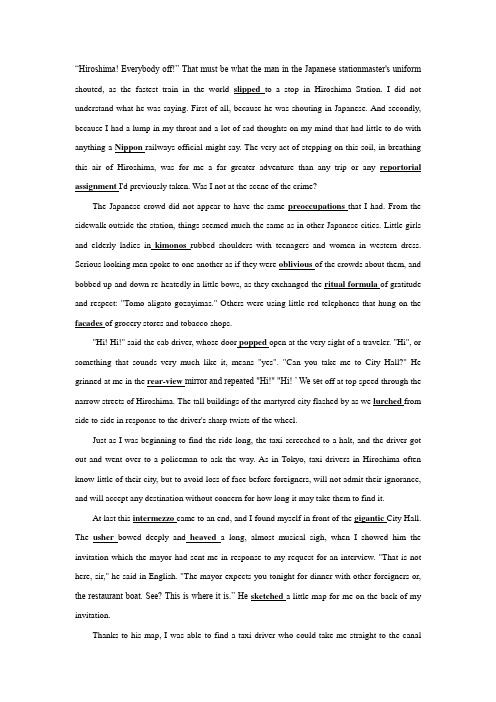
“Hiroshima! Everybody off!” That must be what the man in the Japanese stationmaster's uniform shouted, as the fastest train in the world slipped to a stop in Hiroshima Station. I did not understand what he was saying. First of all, because he was shouting in Japanese. And secondly, because I had a lump in my throat and a lot of sad thoughts on my mind that had little to do with anything a Nippon railways official might say. The very act of stepping on this soil, in breathing this air of Hiroshima, was for me a far greater adventure than any trip or any reportorial assignment I'd previously taken. Was I not at the scene of the crime?The Japanese crowd did not appear to have the same preoccupations that I had. From the sidewalk outside the station, things seemed much the same as in other Japanese cities. Little girls and elderly ladies in kimonos rubbed shoulders with teenagers and women in western dress. Serious looking men spoke to one another as if they were oblivious of the crowds about them, and bobbed up and down re-heatedly in little bows, as they exchanged the ritual formula of gratitude and respect: "Tomo aligato gozayimas." Others were using little red telephones that hung on the facades of grocery stores and tobacco shops."Hi! Hi!" said the cab driver, whose door popped open at the very sight of a traveler. "Hi", or something that sounds very much like it, means "yes". "Can you take me to City Hall?" He grinned at me in the rear-view mirror and repeated "Hi!" "Hi! ’ We se t off at top speed through the narrow streets of Hiroshima. The tall buildings of the martyred city flashed by as we lurched from side to side in response to the driver's sharp twists of the wheel.Just as I was beginning to find the ride long, the taxi screeched to a halt, and the driver got out and went over to a policeman to ask the way. As in Tokyo, taxi drivers in Hiroshima often know little of their city, but to avoid loss of face before foreigners, will not admit their ignorance, and will accept any destination without concern for how long it may take them to find it.At last this intermezzo came to an end, and I found myself in front of the gigantic City Hall. The usher bowed deeply and heaved a long, almost musical sigh, when I showed him the invitation which the mayor had sent me in response to my request for an interview. "That is not here, sir," he said in English. "The mayor expects you tonight for dinner with other foreigners or, the restaurant boat. See? This is where it is.” He sketched a little map for me on the back of my invitation.Thanks to his map, I was able to find a taxi driver who could take me straight to the canalembankment , where a sort of barge with a roof like one on a Japanese house was moored . The Japanese build their traditional houses on boats when land becomes too expensive. The rather arresting spectacle of little old Japan adrift adrift amid beige concrete skyscrapers is the very symbol of the incessant struggle between the kimono and the miniskirt.At the door to the restaurant, a stunning, porcelain-faced woman in traditional costume asked me to remove my shoes. This done, I entered one of the low-ceilinged rooms of the little floating house, treading cautiously on the soft matting and experiencing a twinge of embarrassment at the prospect of meeting the mayor of Hiroshima in my socks.He was a tall, thin man, sad-eyed and serious. Quite unexpectedly, the strange emotion which had overwhelmed me at the station returned, and I was again crushed by the thought that I now stood on the site of the first atomic bombardment, where thousands upon thousands of people had been slain in one second, where thousands upon thousands of others had lingered on to die in slow agony .The introductions were made. Most of the guests were Japanese, and it was difficult for me to ask them just why we were gathered here. The few Americans and Germans seemed just as inhibited as I was. "Gentlemen," said the mayor, "I am happy to welcome you to Hiroshima."Everyone bowed, including the Westerners. After three days in Japan, the spinal column becomes extraordinarily flexible."Gentlemen, it is a very great honor to have you her e in Hiroshima."There were fresh bows, and the faces grew more and more serious each time the name Hiroshima was repeated."Hiroshima, as you know, is a city familiar to everyone,” continued the mayor."Yes, yes, of course,” murmured the company, more and more agitated."Seldom has a city gained such world renown, and I am proud and happy to welcome you to Hiroshima, a town known throughout the world for its--- oysters".I was just about to make my little bow of assent, when the meaning of these last words sank in, jolting me out of my sad reverie ."Hiroshima –oysters? What about the bomb and the misery and humanity's most heinous crime?" While the mayor went on with his speech in praise of southern Japanese sea food, I cautiously backed away and headed toward the far side of the room, where a few men were talkingamong themselves and paying little attention to the mayor's speech. "You look puzzled," said a small Japanese man with very large eye-glasses."Well, I must confess that I did not expect a speech about oysters here. I thought that Hiroshima still felt the impact of the atomic impact .""No one talks about it any more, and no one wants to, especially, the people who were born here or who lived through it. "Do you feel the same way, too?""I was here, but I was not in the center of town. I tell you this because I am almost an old man. There are two different schools of thought in this city of oysters, one that would like to preserve traces of the bomb, and the other that would like to get rid of everything, even the monument that was erected at the point of impact. They would also like to demolish the atomic museum.""Why would they want to do that?""Because it hurts everybody, and because time marches on. That is why." The small Japanese man smiled, his eyes nearly closed behind their thick lenses. "If you write about this city, do not forget to say that it is the gayest city in Japan, even it many of the town's people still bear hidden wounds, and burns."Like any other, the hospital smelled of formaldehyde and ethere . Stretchers and wheelchairs lined the walls of endless corridors, and nurses walked by carrying Stretchers instruments, the very sight of which would send shivers down the spine of any healthy visitor. The so-called atomic section was located on the third floor. It consisted of 17 beds."I am a fisherman by trade. I have been here a very long time, more than twenty years, "said an old man in Japanese pajamas. “What is wrong with you?”"Something inside. I was in Hiroshima when it happened. I saw the fire ball. But I had no burns on my face or body. I ran all over the city looking for missing friends and relatives. I thought somehow I had been spared. But later my hair began to fall out, and my belly turned to water. I felt sick, and ever since then they have been testing and treating me. " The doctor at my side explained and commented upon the old man's story, "We still hare a handful of patients here who are being kept alive by constant car e. The other s died as a result of their injuries, or else committed suicide . ""Why did they commit suicide?""It is humiliating to survive in this city. If you bear any visible scars of atomic burns, your children will encounter prejudice on the par t of those who do not. No one will marry the daughter or the niece of an atomic bomb victim. People are afraid of genetic damage from the radiation." The old fisherman gazed at me politely and with interest.Hanging over the patient was a big ball made of bits of brightly colored paper, folded into the shape of tiny birds. "What's that?" I asked."Those are my lucky birds. Each day that I escape death, each day of suffering that helps to free me from earthly cares, I make a new little paper bird, and add it to the others. This way I look at them and congratulate myself of the good fortune that my illness has brought me. Because, thanks to it, I have the opportunity to improve my character."Once again, outside in the open air, I tore into little pieces a small notebook with questions that I'd prepared in advance for inter views with the patients of the atomic ward. Among them was the question: Do you really think that Hiroshima is the liveliest city in Japan? I never asked it. But I could read the answer in every eye.“广岛到了!大家请下车!”当世界上最快的高速列车减速驶进广岛车站并渐渐停稳时,那位身着日本火车站站长制服的男人口中喊出的一定是这样的话。
高级英语 Lesson2 Marrakech 课件
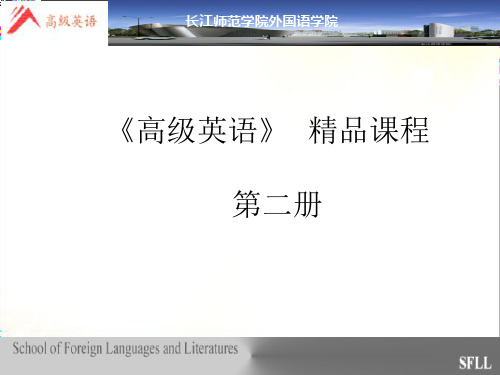
Six Scenes to expose the evils of colonialism
Why did the writer choose these scenes? What do you think they represent? Do you think these scenes are effective to achieve the writer’s purpose? What else would you add? What is the tone of the writer throughout the text?
The list of action verbs are all single-syllabic, showing the quick speed and simple burying procedure
Are they really…? Do they …? Or are they … individual as bees or coral insects?
A list of rhetorical questions added force to author‘s denunciation
They rise out of the earth, they sweat and starve for a few years, and then they sink back into the nameless mounds of the graveyard and nobody notices that they are gone.
1955wroteprofilesincouragewhichwonthepulitzerprizeinhistorypresidentoftheunitedstates196163???????????????????johnfitzgeraldkennedy19171963born
【ppt课件】高级英语课本第2课课件.ppt
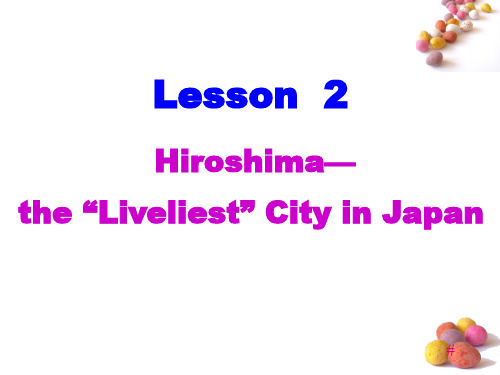
Atomic Bombing over Hiroshima
On August 6, 1945, during World War II (1939-1945), the first atomic bomb was dropped on the city of Hiroshima, a military center, by the United States Army Air Forces. According to U.S. estimates, 60,000 to 70,000 people were killed or missing as a result of the bomb and many more were made homeless. (In 1940, the population of Hiroshima was 343,698.)
#
The Bomb Called “Little Boy” (H1.47m)
Though the bomb was long and thin in shape, it grew shorter over the course of the project. Hence, the final bomb was called “Little Boy ”.
Many more later died of injuries and the effects of radiation. Casualties ered nearly 130,000. Survivors are still dying of leukemia, pernicious anemia and other diseases induced by radiation.
1. About Hiroshima 2. Atomic Bomb
(完整版)高英第2课课文
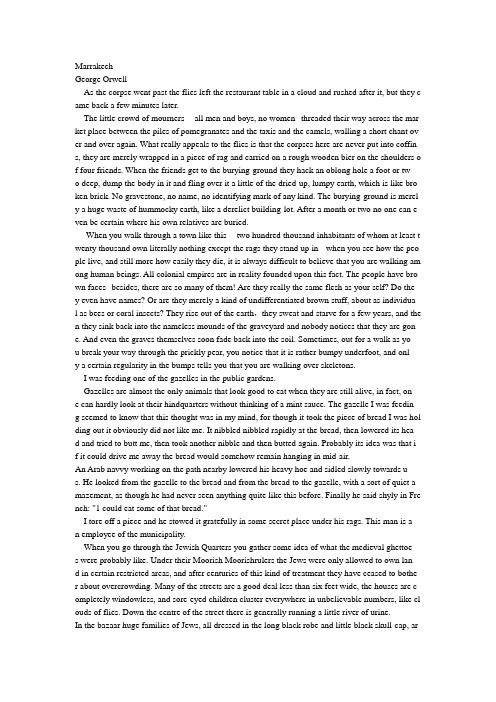
MarrakechGeorge OrwellAs the corpse went past the flies left the restaurant table in a cloud and rushed after it, but they c ame back a few minutes later.The little crowd of mourners -- all men and boys, no women--threaded their way across the mar ket place between the piles of pomegranates and the taxis and the camels, walling a short chant ov er and over again. What really appeals to the flies is that the corpses here are never put into coffin s, they are merely wrapped in a piece of rag and carried on a rough wooden bier on the shoulders o f four friends. When the friends get to the burying-ground they hack an oblong hole a foot or two deep, dump the body in it and fling over it a little of the dried-up, lumpy earth, which is like bro ken brick. No gravestone, no name, no identifying mark of any kind. The burying-ground is merel y a huge waste of hummocky earth, like a derelict building-lot. After a month or two no one can e ven be certain where his own relatives are buried.When you walk through a town like this -- two hundred thousand inhabitants of whom at least t wenty thousand own literally nothing except the rags they stand up in-- when you see how the peo ple live, and still more how easily they die, it is always difficult to believe that you are walking am ong human beings. All colonial empires are in reality founded upon this fact. The people have bro wn faces--besides, there are so many of them! Are they really the same flesh as your self? Do the y even have names? Or are they merely a kind of undifferentiated brown stuff, about as individua l as bees or coral insects? They rise out of the earth,they sweat and starve for a few years, and the n they sink back into the nameless mounds of the graveyard and nobody notices that they are gon e. And even the graves themselves soon fade back into the soil. Sometimes, out for a walk as you break your way through the prickly pear, you notice that it is rather bumpy underfoot, and only a certain regularity in the bumps tells you that you are walking over skeletons.I was feeding one of the gazelles in the public gardens.Gazelles are almost the only animals that look good to eat when they are still alive, in fact, on e can hardly look at their hindquarters without thinking of a mint sauce. The gazelle I was feedin g seemed to know that this thought was in my mind, for though it took the piece of bread I was hol ding out it obviously did not like me. It nibbled nibbled rapidly at the bread, then lowered its hea d and tried to butt me, then took another nibble and then butted again. Probably its idea was that i f it could drive me away the bread would somehow remain hanging in mid-air.An Arab navvy working on the path nearby lowered his heavy hoe and sidled slowly towards u s. He looked from the gazelle to the bread and from the bread to the gazelle, with a sort of quiet a mazement, as though he had never seen anything quite like this before. Finally he said shyly in Fre nch: "1 could eat some of that bread."I tore off a piece and he stowed it gratefully in some secret place under his rags. This man is a n employee of the municipality.When you go through the Jewish Quarters you gather some idea of what the medieval ghettoe s were probably like. Under their Moorish Moorishrulers the Jews were only allowed to own lan d in certain restricted areas, and after centuries of this kind of treatment they have ceased to bothe r about overcrowding. Many of the streets are a good deal less than six feet wide, the houses are c ompletely windowless, and sore-eyed children cluster everywhere in unbelievable numbers, like cl ouds of flies. Down the centre of the street there is generally running a little river of urine.In the bazaar huge families of Jews, all dressed in the long black robe and little black skull-cap, are working in dark fly-infested booths that look like caves. A carpenter sits crosslegged at a prehist oric lathe, turning chairlegs at lightning speed. He works the lathe with a bow in his right hand an d guides the chisel with his left foot, and thanks to a lifetime of sitting in this position his left leg i s warped out of shape. At his side his grandson, aged six, is already starting on the simpler parts o f the job.I was just passing the coppersmiths' booths when somebody noticed that I was lighting a cigaret te. Instantly, from the dark holes all round, there was a frenzied rush of Jews, many of them old gr andfathers with flowing grey beards, all clamouring for a cigarette. Even a blind man somewhere at the back of one of the booths heard a rumour of cigarettes and came crawling out, groping in the air with his hand. In about a minute I had used up the whole packet. None of these people, I s uppose, works less than twelve hours a day, and every one of them looks on a cigarette as a more o r less impossible luxury.As the Jews live in self-contained communities they follow the same trades as the Arabs, excep t for agriculture. Fruitsellers, potters, silversmiths, blacksmiths, butchers, leather-workers, tailor s, water-carriers, beggars, porters -- whichever way you look you see nothing but Jews. As a matte r of fact there are thirteen thousand of them, all living in the space of a few acres. A good job Hitle t wasn't here. Perhaps he was on his way, however. You hear the usual dark rumours about Jews, n ot only from the Arabs but from the poorer Europeans."Yes vieux mon vieux, they took my job away from me and gave it to a Jew. The Jews! They' re the real rulers of this country, you know. They‘ve got all the money. They control the banks, fin ance -- everything.""But", I said, "isn't it a fact that the average Jew is a labourer working for about a penny an hour? ""Ah, that's only for show! They' re all money lenders really. They' re cunning, the Jews."In just the same way, a couple of hundred years ago, poor old women used to be burned for witc hcraft when they could not even work enough magic to get themselves a square meal. square mea lAll people who work with their hands are partly invisible, and the more important the work the y do, the less visible they are. Still, a white skin is always fairly conspicuous. In northern Europ e, when you see a labourer ploughing a field, you probably give him a second glance. In a hot cou ntry, anywhere south of Gibraltar or east of Suez, the chances are that you don't even see him. I ha ve noticed this again and again. In a tropical landscape one's eye takes in everything except the hu man beings. It takes in the dried-up soil, the prickly pear, the palm tree and the distant mountain, b ut it always misses the peasant hoeing at his patch. He is the same colour as the earth, and a great deal less interesting to look at.It is only because of this that the starved countries of Asia and Africa are accepted as tourist res orts. No one would think of running cheap trips to the Distressed Areas. But where the human bein gs have brown skins their poverty is simply not noticed. What does Morocco mean to a Frenchma n? An orange grove or a job in Government service. Or to an Englishman? Camels, castles, palm tr ees, Foreign Legionnaires, brass trays, and bandits. One could probably live there for years withou t noticing that for nine-tenths of the people the reality of life is an endless back-breaking struggle t o wring a little food out of an eroded soil.Most of Morocco is so desolate that no wild animal bigger than a hare can live on it. Huge area s which were once covered with forest have turned into a treeless waste where the soil is exactly like broken-up brick.Nevertheless a good deal of it is cultivated, with frightful labour. Everything is done by hand. L ong lines of women, bent double like inverted capital Ls, work their way slowly across the fields, t earing up the prickly weeds with their hands, and the peasant gathering lucerne for fodder pulls i t up stalk by stalk instead of reaping it, thus saving an inch or two on each stalk. The plough is a w retched wooden thing, so frail that one can easily carry it on one's shoulder, and fitted underneath with a rough iron spike which stirs the soil to a depth of about four inches. This is as much as th e strength of the animals is equal to. It is usual to plough with a cow and a donkey yoked togethe r. Two donkeys would not be quite strong enough, but on the other hand two cows would cost a litt le more to feed. The peasants possess no narrows, they merely plough the soil several times over i n different directions, finally leaving it in rough furrows, after which the whole field has to be sha ped with hoes into small oblong patches to conserve water. Except for a day or two after the rare r ainstorms there is never enough water. A long the edges of the fields channels are hacked out to a depth of thirty or forty feet to get at the tiny trickles which run through the subsoil.Every afternoon a file of very old women passes down the road outside my house, each carryin g a load of firewood. All of them are mummified with age and the sun, and all of them are tiny. It s eems to be generally the case in primitive communities that the women, when they get beyond a c ertain age, shrink to the size of children. One day poor creature who could not have been more tha n four feet tall crept past me under a vast load of wood. I stopped her and put a five-sou sou piec e ( a little more than a farthing into her hand. She answered with a shrill wail, almost a scream, wh ich was partly gratitude but mainly surprise. I suppose that from her point of view, by taking any n otice of her, I seemed almost to be violating a law of nature. She accept- ed her status as an old wo man, that is to say as a beast of burden. When a family is travelling it is quite usual to see a fathe r and a grown-up son riding ahead on donkeys, and an old woman following on foot, carrying th e baggage.But what is strange about these people is their invisibility. For several weeks, always at about th e same time of day, the file of old women had hobbled past the house with their firewood, and tho ugh they had registered themselves on my eyeballs I cannot truly say that I had seen them. Firewo od was passing -- that was how I saw it. It was only that one day I happened to be walking behin d them, and the curious up-and-down motion of a load of wood drew my attention to the human be ing beneath it. Then for the first time I noticed the poor old earth-coloured bodies, bodies reduce d to bones and leathery skin, bent double under the crushing weight. Yet I suppose I had not been f ive minutes on Moroccan soil before I noticed the overloading of the donkeys and was infuriated b y it. There is no question that the donkeys are damnably treated. The Moroccan donkey is hardly b igger than a St. Bernard dog, it carries a load which in the British Army would be considered too much for a fifteen-hands mule, and very often its packsaddle is not taken off its back for weeks t ogether. But what is peculiarly pitiful is that it is the most willing creature on earth, it follows its master like a dog and does not need either bridle or halter . After a dozen years of devoted work i t suddenly drops dead, whereupon its master tips it into the ditch and the village dogs have torn it s guts out before it is cold.This kind of thing makes one's blood boil, whereas-- on the whole -- the plight of the human bei ngs does not. I am not commenting, merely pointing to a fact. People with brown skins are next do or to invisible. Anyone can be sorry for the donkey with its galled back, but it is generally owing t o some kind of accident if one even notices the old woman under her load of sticks.As the storks flew northward the Negroes were marching southward -- a long, dusty column, inf antry , screw-gun batteries, and then more infantry, four or five thousand men in all, winding up th e road with a clumping of boots and a clatter of iron wheels.They were Senegalese, the blackest Negroes in Africa, so black that sometimes it is difficult to s ee whereabouts on their necks the hair begins. Their splendid bodies were hidden in reach-me-do wn khaki uniforms, their feet squashed into boots that looked like blocks of wood, and every tin h at seemed to be a couple of sizes too small. It was very hot and the men had marched a long wa y. They slumped under the weight of their packs and the curiously sensitive black faces were gliste ning with sweat.As they went past, a tall, very young Negro turned and caught my eye. But the look he gave m e was not in the least the kind of look you might expect. Not hostile, not contemptuous, not sulle n, not even inquisitive. It was the shy, wide-eyed Negro look, which actually is a look of profoun d respect. I saw how it was. This wretched boy, who is a French citizen and has therefore been dra gged from the forest to scrub floors and catch syphilis in garrison towns, actually has feelings of re verence before a white skin. He has been taught that the white race are his masters, and he still bel ieves it. But there is one thought which every white man (and in this connection it doesn't matter t wopence if he calls himself a socialist) thinks when he sees a black army marching past. "How mu ch longer can we go on kidding these people? How long before they turn their guns in the other dir ection?"It was curious really. Every white man there had this thought stowed somewhere or other in hi s mind. I had it, so had the other onlookers, so had the officers on their sweating chargers and the white N. C. Os marching in the ranks. It was a kind of secret which we all knew and were too cle ver to tell; only the Negroes didn't know it. And really it was like watching a flock of cattle to see t he long column, a mile or two miles of armed men, flowing peacefully up the road, while the grea t white birds drifted over them in the opposite direction, glittering like scraps of Paper.(from Reading for Rhetoric, by Caroline Shrodes,Clifford A. Josephson, and James R. Wilson)。
高英第二课(1)

和美国政府想尽快迫使日本投降,也想以此抑制
苏联,于是杜鲁门决定在日本的广岛、长崎等四 个城市中选择一个目标投掷原子弹。在此之前,
美国、英国和中国发表了《波茨坦公告》,敦促
日本投降。7月28日,日本政府拒绝接受《波茨坦
公告》。出于军事和政治的原因,美国政府便按
照原定计划,对日本使用原子弹。
鲍春燕2008年8月于武汉
1945年8月6日早晨8时整,3架B-29美机又从 高空进入广岛上空。这时很多广岛市民并未进入 防空洞,而是在仰望美机。在此以前,B-29已连 续数天飞临日本领空进行训练,但这一次的3架 飞机中,有一架已经装上了一颗5吨重的原子弹。 此时正奉命来轰炸广岛。
the sea or wind . 26 incessant: never stopping, it implies ceaseless 27 stun: to make unconscious by hitting the head. e.g. The robbers stunned the guard by
起巨大的蘑菇状烟云,接着便竖起几
俯 瞰 炸 后 广 岛
鲍春燕2008年8月于武汉
原子弹爆炸的强烈光波,使成千上万人双目 失明;10亿度的高温,把一切都化为灰烬;放射
雨使一些人在以后20年中缓慢地走向死亡;冲击
波形成的狂风,又把所有的建筑物摧毁殆尽。处
automobile) that gives a view of the
area behind the vehicle.
鲍春燕2008年8月于武汉
12 martyr: person who is put to death or caused to suffer for his beliefs or for the sake of a great cause or principle. e.g. a martyr to love (殉情) / duty (殉职) Eternal life to the revolutionary martyrs! 13 lurch: to move with irregular sudden
(完整版)高级英语第二册lesson2
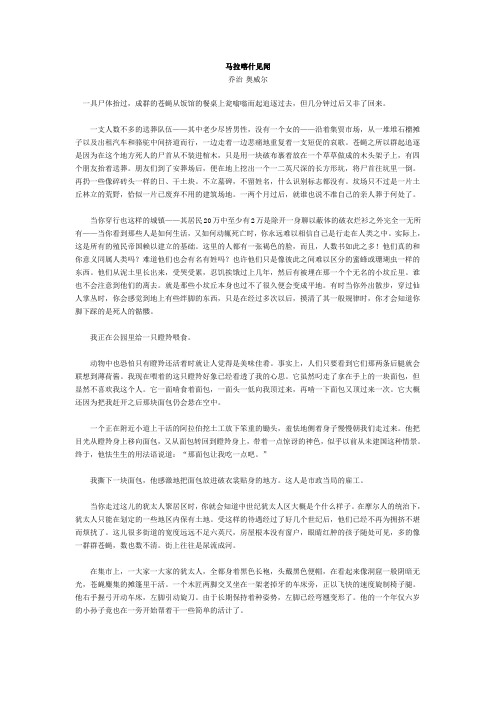
马拉喀什见闻乔治·奥威尔一具尸体抬过,成群的苍蝇从饭馆的餐桌上瓮嗡嗡而起追逐过去,但几分钟过后又非了回来。
一支人数不多的送葬队伍——其中老少尽皆男性,没有一个女的——沿着集贸市场,从一堆堆石榴摊子以及出租汽车和骆驼中间挤道而行,一边走着一边悲痛地重复着一支短促的哀歌。
苍蝇之所以群起追逐是因为在这个地方死人的尸首从不装进棺木,只是用一块破布裹着放在一个草草做成的木头架子上,有四个朋友抬着送葬。
朋友们到了安葬场后,便在地上挖出一个一二英尺深的长方形坑,将尸首往坑里一倒。
再扔一些像碎砖头一样的日、干土块。
不立墓碑,不留姓名,什么识别标志都没有。
坟场只不过是一片土丘林立的荒野,恰似一片已废弃不用的建筑场地。
一两个月过后,就谁也说不准自己的亲人葬于何处了。
当你穿行也这样的城镇——其居民20万中至少有2万是除开一身聊以蔽体的破衣烂衫之外完全一无所有——当你看到那些人是如何生活,又如何动辄死亡时,你永远难以相信自己是行走在人类之中。
实际上,这是所有的殖民帝国赖以建立的基础。
这里的人都有一张褐色的脸,而且,人数书如此之多!他们真的和你意义同属人类吗?难道他们也会有名有姓吗?也许他们只是像彼此之间难以区分的蜜蜂或珊瑚虫一样的东西。
他们从泥土里长出来,受哭受累,忍饥挨饿过上几年,然后有被埋在那一个个无名的小坟丘里。
谁也不会注意到他们的离去。
就是那些小坟丘本身也过不了很久便会变成平地。
有时当你外出散步,穿过仙人掌丛时,你会感觉到地上有些绊脚的东西,只是在经过多次以后,摸清了其一般规律时,你才会知道你脚下踩的是死人的骷髅。
我正在公园里给一只瞪羚喂食。
动物中也恐怕只有瞪羚还活着时就让人觉得是美味佳肴。
事实上,人们只要看到它们那两条后腿就会联想到薄荷酱。
我现在喂着的这只瞪羚好象已经看透了我的心思。
它虽然叼走了拿在手上的一块面包,但显然不喜欢我这个人。
它一面啃食着面包,一面头一低向我顶过来,再啃一下面包又顶过来一次。
高级英语第二册lesson2
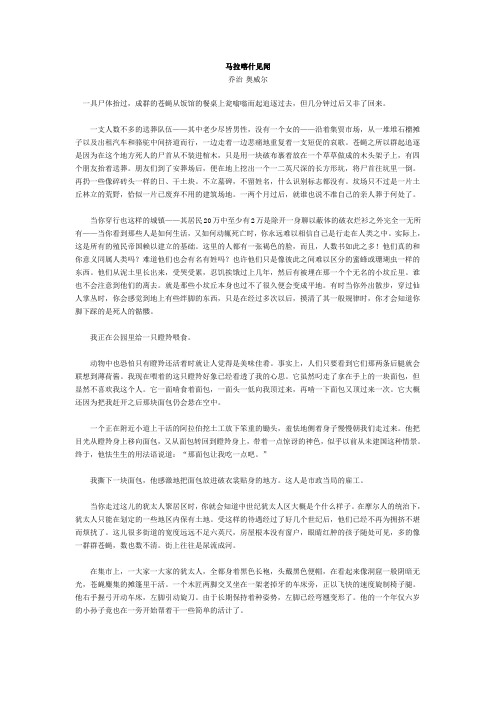
马拉喀什见闻乔治·奥威尔一具尸体抬过,成群的苍蝇从饭馆的餐桌上瓮嗡嗡而起追逐过去,但几分钟过后又非了回来。
一支人数不多的送葬队伍——其中老少尽皆男性,没有一个女的——沿着集贸市场,从一堆堆石榴摊子以及出租汽车和骆驼中间挤道而行,一边走着一边悲痛地重复着一支短促的哀歌。
苍蝇之所以群起追逐是因为在这个地方死人的尸首从不装进棺木,只是用一块破布裹着放在一个草草做成的木头架子上,有四个朋友抬着送葬。
朋友们到了安葬场后,便在地上挖出一个一二英尺深的长方形坑,将尸首往坑里一倒。
再扔一些像碎砖头一样的日、干土块。
不立墓碑,不留姓名,什么识别标志都没有。
坟场只不过是一片土丘林立的荒野,恰似一片已废弃不用的建筑场地。
一两个月过后,就谁也说不准自己的亲人葬于何处了。
当你穿行也这样的城镇——其居民20万中至少有2万是除开一身聊以蔽体的破衣烂衫之外完全一无所有——当你看到那些人是如何生活,又如何动辄死亡时,你永远难以相信自己是行走在人类之中。
实际上,这是所有的殖民帝国赖以建立的基础。
这里的人都有一张褐色的脸,而且,人数书如此之多!他们真的和你意义同属人类吗?难道他们也会有名有姓吗?也许他们只是像彼此之间难以区分的蜜蜂或珊瑚虫一样的东西。
他们从泥土里长出来,受哭受累,忍饥挨饿过上几年,然后有被埋在那一个个无名的小坟丘里。
谁也不会注意到他们的离去。
就是那些小坟丘本身也过不了很久便会变成平地。
有时当你外出散步,穿过仙人掌丛时,你会感觉到地上有些绊脚的东西,只是在经过多次以后,摸清了其一般规律时,你才会知道你脚下踩的是死人的骷髅。
我正在公园里给一只瞪羚喂食。
动物中也恐怕只有瞪羚还活着时就让人觉得是美味佳肴。
事实上,人们只要看到它们那两条后腿就会联想到薄荷酱。
我现在喂着的这只瞪羚好象已经看透了我的心思。
它虽然叼走了拿在手上的一块面包,但显然不喜欢我这个人。
它一面啃食着面包,一面头一低向我顶过来,再啃一下面包又顶过来一次。
(完整版)高英第2课课文
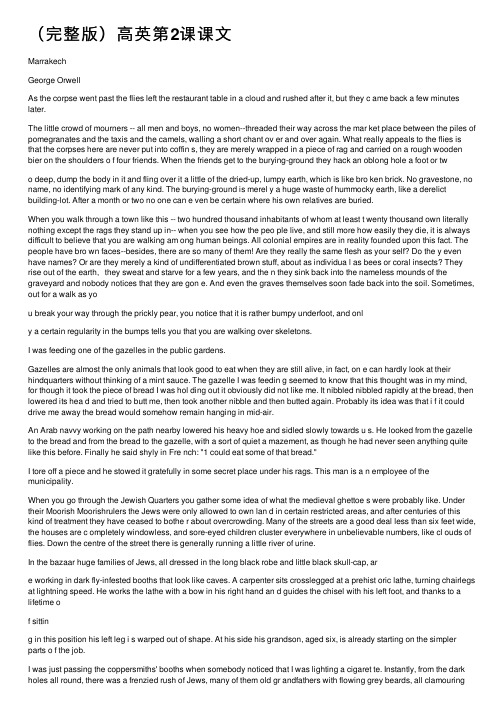
(完整版)⾼英第2课课⽂MarrakechGeorge OrwellAs the corpse went past the flies left the restaurant table in a cloud and rushed after it, but they c ame back a few minutes later.The little crowd of mourners -- all men and boys, no women--threaded their way across the mar ket place between the piles of pomegranates and the taxis and the camels, walling a short chant ov er and over again. What really appeals to the flies is that the corpses here are never put into coffin s, they are merely wrapped in a piece of rag and carried on a rough wooden bier on the shoulders o f four friends. When the friends get to the burying-ground they hack an oblong hole a foot or two deep, dump the body in it and fling over it a little of the dried-up, lumpy earth, which is like bro ken brick. No gravestone, no name, no identifying mark of any kind. The burying-ground is merel y a huge waste of hummocky earth, like a derelict building-lot. After a month or two no one can e ven be certain where his own relatives are buried.When you walk through a town like this -- two hundred thousand inhabitants of whom at least t wenty thousand own literally nothing except the rags they stand up in-- when you see how the peo ple live, and still more how easily they die, it is always difficult to believe that you are walking am ong human beings. All colonial empires are in reality founded upon this fact. The people have bro wn faces--besides, there are so many of them! Are they really the same flesh as your self? Do the y even have names? Or are they merely a kind of undifferentiated brown stuff, about as individua l as bees or coral insects? They rise out of the earth,they sweat and starve for a few years, and the n they sink back into the nameless mounds of the graveyard and nobody notices that they are gon e. And even the graves themselves soon fade back into the soil. Sometimes, out for a walk as you break your way through the prickly pear, you notice that it is rather bumpy underfoot, and only a certain regularity in the bumps tells you that you are walking over skeletons.I was feeding one of the gazelles in the public gardens.Gazelles are almost the only animals that look good to eat when they are still alive, in fact, on e can hardly look at their hindquarters without thinking of a mint sauce. The gazelle I was feedin g seemed to know that this thought was in my mind, for though it took the piece of bread I was hol ding out it obviously did not like me. It nibbled nibbled rapidly at the bread, then lowered its hea d and tried to butt me, then took another nibble and then butted again. Probably its idea was that i f it could drive me away the bread would somehow remain hanging in mid-air.An Arab navvy working on the path nearby lowered his heavy hoe and sidled slowly towards u s. He looked from the gazelle to the bread and from the bread to the gazelle, with a sort of quiet a mazement, as though he had never seen anything quite like this before. Finally he said shyly in Fre nch: "1 could eat some of that bread."I tore off a piece and he stowed it gratefully in some secret place under his rags. This man is a n employee of the municipality.When you go through the Jewish Quarters you gather some idea of what the medieval ghettoe s were probably like. Under their Moorish Moorishrulers the Jews were only allowed to own lan d in certain restricted areas, and after centuries of this kind of treatment they have ceased to bothe r about overcrowding. Many of the streets are a good deal less than six feet wide, the houses are c ompletely windowless, and sore-eyed children cluster everywhere in unbelievable numbers, like cl ouds of flies. Down the centre of the street there is generally running a little river of urine.In the bazaar huge families of Jews, all dressed in the long black robe and little black skull-cap, are working in dark fly-infested booths that look like caves. A carpenter sits crosslegged at a prehist oric lathe, turning chairlegs at lightning speed. He works the lathe with a bow in his right hand an d guides the chisel with his left foot, and thanks to a lifetime of sitting in this position his left leg i s warped out of shape. At his side his grandson, aged six, is already starting on the simpler parts o f the job.I was just passing the coppersmiths' booths when somebody noticed that I was lighting a cigaret te. Instantly, from the dark holes all round, there was a frenzied rush of Jews, many of them old gr andfathers with flowing grey beards, all clamouringfor a cigarette. Even a blind man somewhere at the back of one of the booths heard a rumour of cigarettes and came crawling out, groping in the air with his hand. In about a minute I had used up the whole packet. None of these people, I s uppose, works less than twelve hours a day, and every one of them looks on a cigarette as a more o r less impossible luxury.As the Jews live in self-contained communities they follow the same trades as the Arabs, excep t for agriculture. Fruitsellers, potters, silversmiths, blacksmiths, butchers, leather-workers, tailor s, water-carriers, beggars, porters -- whichever way you look you see nothing but Jews. As a matte r of fact there are thirteen thousand of them, all living in the space of a few acres. A good job Hitle t wasn't here. Perhaps he was on his way, however. You hear the usual dark rumours about Jews, n ot only from the Arabs but from the poorer Europeans."Yes vieux mon vieux, they took my job away from me and gave it to a Jew. The Jews! They' re the real rulers of this country, you know. They‘ve got all the money. They control the banks, fin ance -- everything.""But", I said, "isn't it a fact that the average Jew is a labourer working for about a penny an hour? ""Ah, that's only for show! They' re all money lenders really. They' re cunning, the Jews."In just the same way, a couple of hundred years ago, poor old women used to be burned for witc hcraft when they could not even work enough magic to get themselves a square meal. square mea lAll people who work with their hands are partly invisible, and the more important the work the y do, the less visible they are. Still, a white skin is always fairly conspicuous. In northern Europ e, when you see a labourer ploughing a field, you probably give him a second glance. In a hot cou ntry, anywhere south of Gibraltar or east of Suez, the chances are that you don't even see him. I ha ve noticed this again and again. In a tropical landscape one's eye takes in everything except the hu man beings. It takes in the dried-up soil, the prickly pear, the palm tree and the distant mountain, b ut it always misses the peasant hoeing at his patch. He is the same colour as the earth, and a great deal less interesting to look at.It is only because of this that the starved countries of Asia and Africa are accepted as tourist res orts. No one would think of running cheap trips to the Distressed Areas. But where the human bein gs have brown skins their poverty is simply not noticed. What does Morocco mean to a Frenchma n? An orange grove or a job in Government service. Or to an Englishman? Camels, castles, palm tr ees, Foreign Legionnaires, brass trays, and bandits. One could probably live there for years withou t noticing that for nine-tenths of the people the reality of life is an endless back-breaking struggle t o wring a little food out of an eroded soil.Most of Morocco is so desolate that no wild animal bigger than a hare can live on it. Huge area s which were once covered with forest have turned into a treeless waste where the soil is exactly like broken-up brick.Nevertheless a good deal of it is cultivated, with frightful labour. Everything is done by hand. L ong lines of women, bent double like inverted capital Ls, work their way slowly across the fields, t earing up the prickly weeds with their hands, and the peasant gathering lucerne for fodder pulls i t up stalk by stalk instead of reaping it, thus saving an inch or two on each stalk. The plough is a w retched wooden thing, so frail that one can easily carry it on one's shoulder, and fitted underneath with a rough iron spike which stirs the soil to a depth of about four inches. This is as much as th e strength of the animals is equal to. It is usual to plough with a cow and a donkey yoked togethe r. Two donkeys would not be quite strong enough, but on the other hand two cows would cost a litt le more to feed. The peasants possess no narrows, they merely plough the soil several times over i n different directions, finally leaving it in rough furrows, after which the whole field has to be sha ped with hoes into small oblong patches to conserve water. Except for a day or two after the rare r ainstorms there is never enough water. A long the edges of the fields channels are hacked out to a depth of thirty or forty feet to get at the tiny trickles which run through the subsoil.Every afternoon a file of very old women passes down the road outside my house, each carryin g a load of firewood. All of them are mummified with age and the sun, and all of them are tiny. It s eems to be generally the case in primitivecommunities that the women, when they get beyond a c ertain age, shrink to the size of children. One day poor creature who could not have been more tha n four feet tall crept past me under a vast load of wood. I stopped her and put a five-sou sou piec e ( a little more than a farthing into her hand. She answered with a shrill wail, almost a scream, wh ich was partly gratitude but mainly surprise. I suppose that from her point of view, by taking any n otice of her, I seemed almost to be violating a law of nature. She accept- ed her status as an old wo man, that is to say as a beast of burden. When a family is travelling it is quite usual to see a fathe r and a grown-up son riding ahead on donkeys, and an old woman following on foot, carrying th e baggage.But what is strange about these people is their invisibility. For several weeks, always at about th e same time of day, the file of old women had hobbled past the house with their firewood, and tho ugh they had registered themselves on my eyeballs I cannot truly say that I had seen them. Firewo od was passing -- that was how I saw it. It was only that one day I happened to be walking behin d them, and the curious up-and-down motion of a load of wood drew my attention to the human be ing beneath it. Then for the first time I noticed the poor old earth-coloured bodies, bodies reduce d to bones and leathery skin, bent double under the crushing weight. Yet I suppose I had not been f ive minutes on Moroccan soil before I noticed the overloading of the donkeys and was infuriated b y it. There is no question that the donkeys are damnably treated. The Moroccan donkey is hardly b igger than a St. Bernard dog, it carries a load which in the British Army would be considered to o much for a fifteen-hands mule, and very often its packsaddle is not taken off its back for weeks t ogether. But what is peculiarly pitiful is that it is the most willing creature on earth, it follows its master like a dog and does not need either bridle or halter . After a dozen years of devoted work i t suddenly drops dead, whereupon its master tips it into the ditch and the village dogs have torn it s guts out before it is cold.This kind of thing makes one's blood boil, whereas-- on the whole -- the plight of the human bei ngs does not. I am not commenting, merely pointing to a fact. People with brown skins are next do or to invisible. Anyone can be sorry for the donkey with its galled back, but it is generally owing t o some kind of accident if one even notices the old woman under her load of sticks.As the storks flew northward the Negroes were marching southward -- a long, dusty column, inf antry , screw-gun batteries, and then more infantry, four or five thousand men in all, winding up th e road with a clumping of boots and a clatter of iron wheels.They were Senegalese, the blackest Negroes in Africa, so black that sometimes it is difficult to s ee whereabouts on their necks the hair begins. Their splendid bodies were hidden in reach-me-do wn khaki uniforms, their feet squashed into boots that looked like blocks of wood, and every tin h at seemed to be a couple of sizes too small. It was very hot and the men had marched a long wa y. They slumped under the weight of their packs and the curiously sensitive black faces were gliste ning with sweat.As they went past, a tall, very young Negro turned and caught my eye. But the look he gave m e was not in the least the kind of look you might expect. Not hostile, not contemptuous, not sulle n, not even inquisitive. It was the shy, wide-eyed Negro look, which actually is a look of profoun d respect. I saw how it was. This wretched boy, who is a French citizen and has therefore been dra gged from the forest to scrub floors and catch syphilis in garrison towns, actually has feelings of re verence before a white skin. He has been taught that the white race are his masters, and he still bel ieves it. But there is one thought which every white man (and in this connection it doesn't matter t wopence if he calls himself a socialist) thinks when he sees a black army marching past. "How mu ch longer can we go on kidding these people? How long before they turn their guns in the other dir ection?"It was curious really. Every white man there had this thought stowed somewhere or other in hi s mind. I had it, so had the other onlookers, so had the officers on their sweating chargers and the white N. C. Os marching in the ranks. It was a kind of secret which we all knew and were too cle ver to tell; only the Negroes didn't know it. And really it was like watching a flock of cattle to see t he long column, a mile or two miles of armed men, flowing peacefully up the road, while the grea t white birds drifted over them in the opposite direction, glittering like scraps of Paper.(from Reading for Rhetoric, by Caroline Shrodes,Clifford A. Josephson, and James R. Wilson)。
【ppt课件】高级英语课本第2课课件

The Bomb Called “Little Boy” (H1.47m)
Though the bomb was long and thin in shape, it grew shorter over the course of the project. Hence, the final bomb was called “Little Boy ”.
1. About Hiroshima 2. Atomic Bomb
#
Hiroshima
#
Hiroshima
Hiroshima, city on southwestern Honshû Island, Japan, capital of Hiroshima Prefecture, is at the head of Hiroshima Bay, an arm of the Inland Sea. The city was founded in 1594 on six islands in the Ôta River Delta. The name Hiroshima means broad Island. Hiroshima grew rapidly as a castle town and commercial city, and after 1868 it was developed as a military center.
A man burned by the heat ray except where his waistband covered him August 7, 1945 This man exposed within a kilometer of the hypocenter was critically burned over his whole body except where his waistband covered him.
高级英语 第二课_Marrakech_完备课件
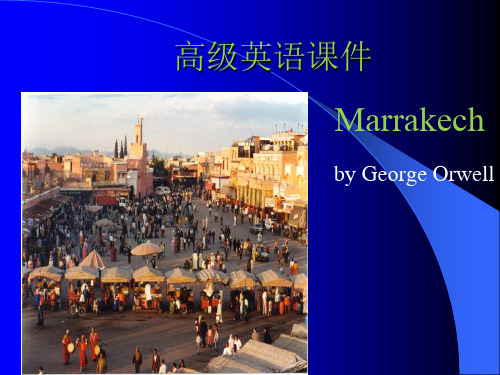
His Life
– He is mush praised in the west partly because of his anti-communist point of view.
– He was born in India, father, a so called empirebuilder --serving the British government abroad.
e. People: most Muslims; Most (70%) Moroccans are farmers, using camels, donkeys and mules to pull plows, trying to try to grow their own food. In the South a few tribesmen still wander from place to place in the desert.
---Renowned for leather goods --- the old city is like a labyrinth (迷宫 ) full of
crooked, deadened streets.
Marrakech
Marrakech is not only a fantastic city, it is also a symbol of the Morocco that once was, and which still survives here. The streets of the old and pink city have been too narrow to allow the introduction of cars, and tourists searching for the "real" Morocco have turned the medieval structures of Marrakech into good business.
高级英语 第二课_Marrakech_完备课件

(describing a period of poverty in these cities);
Burmese Days; Coming up for Air; A Clergyman' s Daughter; Keep the Aspidistra Flying; Animal Farm; and
2. Morocco (摩洛哥)
摩纳哥 地中海沿岸近法-意边界的独立公国。面积:约1.9平方千米。人口:约 31,800(2001)。居民大多是法国人,有少数意大利人。只有不到15%的居民为
摩纳哥后裔。语言:法语(官方语言)。宗教:天主教。货币:法郎。
A small principality located in the south of France in the hills above the
c. In 1912, a FrancoSpanish agreement divided Morocco into 4 administrative zones--French Morocco, Spanish protectorate (保 护国) , a southern protectorate and an international zone .
See notes 1 on page 25
George Orwell was the pseudonym of Eric Arthur Blair (1903-50), an English writer who at one time served with the Indian Imperial Police in Burma. He fought in the Spanish Civil War, an experience he recorded in Homage to Catalonia.
高级英语第二课Lesson Two Four Choices for Young People
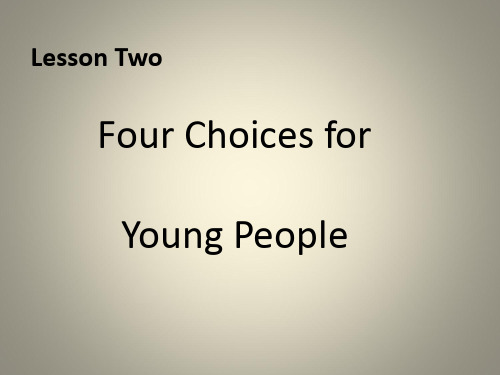
Noble savage 高贵的野蛮人
• First appeared: John Dryden The Conquest of Granada
• First used by: Jean-Jacques Rousseau (1754-1762) Naturalright
Hallucinogens(Para.4) 幻觉剂
• the Allies and the Axis
Backgrounds
War in unfamiliar guise(Para.13)
Non-military war, unfamiliar forms. Such as the War on Poverty launched by President Lyndon Johnson in 1964.
Backgrounds
“The economic machinery had broken down almost everywhere...” (Para. 12) • The economic crisis in western countries in the 1930s
• The Great Depression in U.S.
Brief of the Article
• Youth disillusioned with “the adult world”
• Rebellion • Workable way to deal with problems • 3+1 good way of persuasion
Backgrounds
Backgrounds
Our discovery of the population explosion (Para.13)
高级英语2第二课_图文
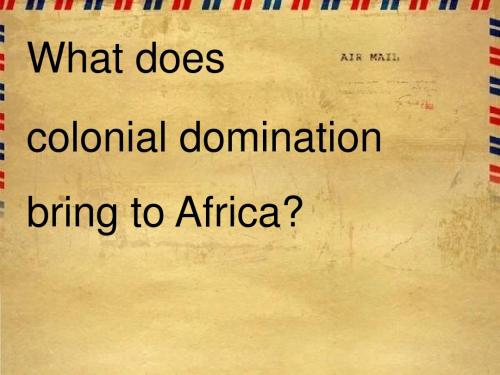
Morocco (摩洛哥)
2. Influences on Africans
Destructions Constructions
Destructions of Colonial Domination
• Exploiting raw materials
1. The historical roots of colonial domination
• The ambitions of imperialists to expand territory and seek hegemony • The abundant natural resources of weak countries
What does colonial domination bring to Africa?
Contents
1.Historical roots of the colonial domination
2.Influences of colonial domination on Africans 3.Our Contemplations of colonial domination
Scene 3
Scene 4
(Paragraph 18) Most of Morocco is so desolate that no wild animal bigger than a hare can live on it. Huge areas which were once covered with forest have turned into a treeless waste where the soil is exactly like broken-up brick. Nevertheless a good deal of it is cultivated, with frightful labour.
高级英语2第二课译文

第二课参考译文马拉喀什随笔乔治·奥威尔1. 一具尸体抬过,成群的苍蝇从饭馆的餐桌上一哄而起,追逐而上,几分钟后又嗡嗡地飞了回来。
2. 一支人数不多的送葬队伍——无论成人或孩子全是男性,没有女性——沿着集贸市场,迂回穿行于一堆堆石榴摊子、出租车和骆驼之间,一边走着一边反复地哀号着一曲短促的悲歌。
真正吸引苍蝇成群追逐的是:这里的尸体从来都不装进棺木,只是用一块破布裹着,放在一个粗糙的木制陈尸架上,由死者的四位朋友抬着送葬。
抵达安葬地后,先在地上挖出一个一两英尺深的长方形坑,随即将尸体往坑里一倒,再扔上一些像碎砖头一样的干土块。
既没有墓碑,也没有留名,更没有任何身份标识。
安葬地不过是一片巨大的土丘林立的荒原,恰似一块废弃的建筑工地。
一两个月之后,谁也说不准自己的亲人究竟葬在何处。
3. 当你徒步经过这样的城镇——20万当地居民当中,至少有两万人除了一身聊以蔽体的破衣烂裳外,一无所有——当你看到那些人何以生存,又何以轻易地死去时,你永远难以相信自己是在人类当中穿行。
事实上,这是所有殖民帝国赖以建立的基础。
这里的人都有一张褐色的脸——而且,他们人数众多!他们果真和你一样同属人类吗?他们也有名有姓吗?或许他们只是像一群群彼此之间难以区分的蜜蜂或珊瑚虫一样的东西。
他们生于土地,受苦受累,忍饥挨饿地过上几年,然后就被埋到无名的小坟丘下。
没有人会注意到他们的离去,甚至那些小坟丘本身也会很快地夷为平地。
有时,当你外出散步,穿过仙人掌丛时,你会感觉到脚下特别的凸凹不平,只有那起伏凹凸的固定形状使你意识到脚下踩的正是死人的骷髅。
4. 我正在公园里给一只瞪羚喂食。
5. 瞪羚几乎是唯一一种在存活时看上去能让人食欲大开的动物。
实际上,人们光看到它的两条后腿就会联想到薄荷酱。
我正在喂着的这只瞪羚似乎已看出了我的心思,尽管它在吃我手上递出去的面包,但显然对我并没什么好感。
它迅速地咬了一小口面包,然后低下头,试图用脑袋顶我,然后又咬一口面包,又顶了一次。
【ppt课件】高级英语课本第2课课件
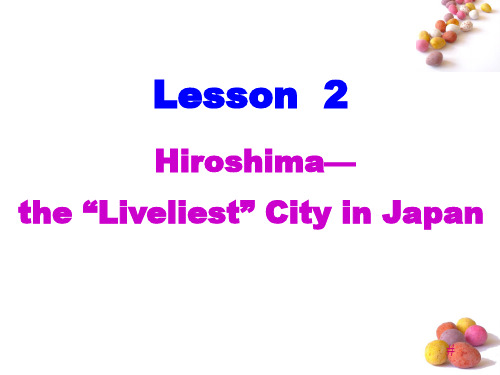
A man burned by the heat ray except where his waistband covered him August 7, 1945 This man exposed within a kilometer of the hypocenter was critically burned over his whole body except where his waistband covered him.
food processing, and brewing are
the main industries.
The Japanese dedicated post-war Hiroshima to peace. A destroyed area named “Peace City” has been set aside as a memorial. A peace park was build.
#
I. Teaching Objectives
• To know the background of “Hiroshima”
• To grasp the main idea and the theme of this essay
• To master the language points
#
II. Background Information
Discussion
• What is your attitude towards the atomic bombing over Hiroshima?
• According to you, is a bombing or a battle an appropriate way of solving problems? Why? Why not?
《高级英语(上)》lesson two
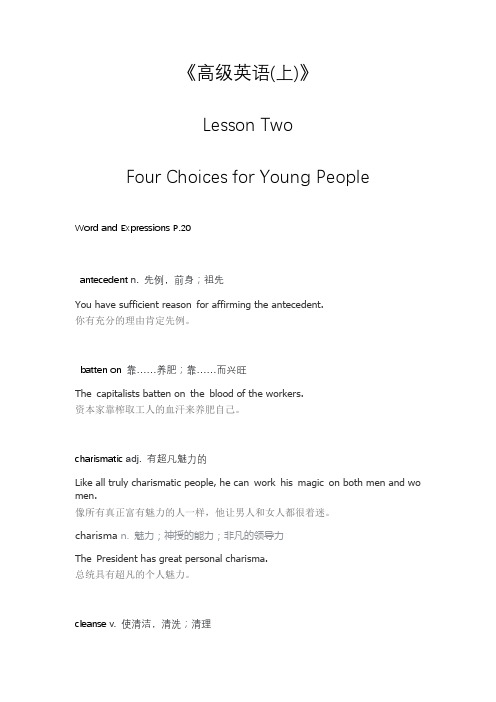
《高级英语(上)》Lesson TwoFour Choices for Young PeopleWord and Expressions P.20antecedent n. 先例,前身;祖先You have sufficient reason for affirming the antecedent.你有充分的理由肯定先例。
batten on 靠……养肥;靠……而兴旺The capitalists batten on the blood of the workers.资本家靠榨取工人的血汗来养肥自己。
charismatic adj. 有超凡魅力的Like all truly charismatic people, he can work his magic on both men and wo men.像所有真正富有魅力的人一样,他让男人和女人都很着迷。
charisma n. 魅力;神授的能力;非凡的领导力The President has great personal charisma.总统具有超凡的个人魅力。
cleanse v. 使清洁,清洗;清理Right after your last cigarette, your body will begin to cleanse itself of tobacc o toxins.在最后一根香烟后,你的身体将马上开始清除烟草毒素。
disillusionment n. 幻灭;醒悟There is widespread disillusionment with the present government.人们对现政府普遍感到失望。
illusion n. 错觉,幻觉;幻想,错误的观念disillusion v. 使醒悟,使不再抱幻想n. 幻灭,失望dwindling 减少;变小;退化In some parts of the world, populations of big trees are dwindling because th eir seedlings cannot survive or grow.在世界上的一些地方,大树的数量正在减少,因为它们的幼苗无法存活或生长。
高级英语Lesson 2 (Book 2) Marrakech 课件PPT

His Life
– He is mush praised in the west partly because of
his anti-communist point of view. – He was born in India, father, a so called empirebuilder --serving the British government abroad.
George Orwell
the master of a superb, lucid (清晰的) prose style. an uncompromising individualist and political idealist famous for his political satires Orwell argued that writers have an obligation of fighting social injustice, oppression, and the power of totalitarian (极权主义的 ) regimes.
His Life
– He received good education in
Britain and studied in the most famous school “Eden”.
His Life
– Marrakech is one of the places he travelled to. His
2. Morocco (摩洛哥)
摩纳哥 地中海沿岸近法-意边界的独立公国。面积:约1.9平方千米。人口:约 31,800(2001)。居民大多是法国人,有少数意大利人。只有不到15%的居民为 摩纳哥后裔。语言:法语(官方语言)。宗教:天主教。货币:法郎。 A small principality located in the south of France in the hills above the Mediterranean Sea.
【ppt课件】高级英语课本第2课课件.
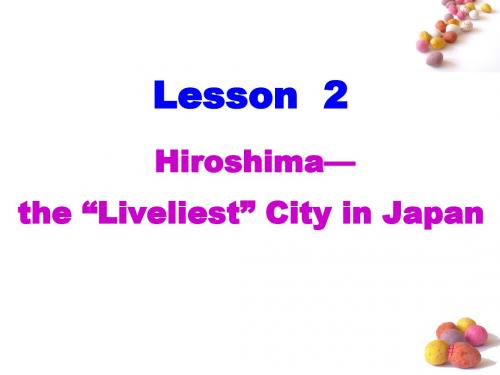
#
Hiroshima
#
Hiroshima
Hiroshima, city on southwestern Honshû Island, Japan, capital of Hiroshima Prefecture, is at the head of Hiroshima Bay, an arm of the Inland Sea. The city was founded in 1594 on six islands in the Ôta River Delta. The name Hiroshima means broad Island. Hiroshima grew al city, and after 1868 it was developed as a military center.
#
Atomic Bombing over Hiroshima
On August 6, 1945, during World War II (1939-1945), the first atomic bomb was dropped on the city of Hiroshima, a military center, by the United States Army Air Forces. According to U.S. estimates, 60,000 to 70,000 people were killed or missing as a result of the bomb and many more were made homeless. (In 1940, the population of Hiroshima was 343,698.)
- 1、下载文档前请自行甄别文档内容的完整性,平台不提供额外的编辑、内容补充、找答案等附加服务。
- 2、"仅部分预览"的文档,不可在线预览部分如存在完整性等问题,可反馈申请退款(可完整预览的文档不适用该条件!)。
- 3、如文档侵犯您的权益,请联系客服反馈,我们会尽快为您处理(人工客服工作时间:9:00-18:30)。
MarrakechGeorge OrwellAs the corpse went past the flies left the resta urant table in a cloud and rushed after it, but t hey came back a few minutes later.The little crowd of mourners -- all men and boy s, no women--threaded their way across the market p lace between the piles of pomegranates and the taxi s and the camels, walling a short chant over an d over again. What really appeals to the flies i s that the corpses here are never put into coffin s, they are merely wrapped in a piece of rag an d carried on a rough wooden bier on the shoulder s of four friends. When the friends get to the bu rying-ground they hack an oblong hole a foot or tw o deep, dump the body in it and fling over i t a little of the dried-up, lumpy earth, which i s like broken brick. No gravestone, no name, no id entifying mark of any kind. The burying-ground is m erely a huge waste of hummocky earth, like a derelict building-lot. After a month or two no one ca n even be certain where his own relatives are buri ed.When you walk through a town like this -- tw o hundred thousand inhabitants of whom at least twe nty thousand own literally nothing except the rag s they stand up in-- when you see how the peopl e live, and still more how easily they die, it i s always difficult to believe that you are walkin g among human beings. All colonial empires are i n reality founded upon this fact. The people hav e brown faces--besides, there are so many of the m! Are they really the same flesh as your self D o they even have names Or are they merely a kin d of undifferentiated brown stuff, about as individu al as bees or coral insects They rise out of th e earth,they sweat and starve for a few years, an d then they sink back into the nameless mounds o f the graveyard and nobody notices that they are g one. And even the graves themselves soon fade bac k into the soil. Sometimes, out for a walk as yo u break your way through the prickly pear, you notice that it is rather bumpy underfoot, and onl y a certain regularity in the bumps tells you tha t you are walking over skeletons.I was feeding one of the gazelles in the publi c gardens.Gazelles are almost the only animals that look go od to eat when they are still alive, in fact, on e can hardly look at their hindquarters without thi nking of a mint sauce. The gazelle I was feedin g seemed to know that this thought was in my min d, for though it took the piece of bread I was h olding out it obviously did not like me. It nibble d nibbled rapidly at the bread, then lowered its h ead and tried to butt me, then took another nibbl e and then butted again. Probably its idea was tha t if it could drive me away the bread would someh ow remain hanging in mid-air.An Arab navvy working on the path nearby lowered h is heavy hoe and sidled slowly towards us. He look ed from the gazelle to the bread and from the bre ad to the gazelle, with a sort of quiet amazement, as though he had never seen anything quite like this before. Finally he said shyly in French: "1 could eat some of that bread."I tore off a piece and he stowed it gratefull y in some secret place under his rags. This man i s an employee of the municipality.When you go through the Jewish Quarters you gathe r some idea of what the medieval ghettoes were pro bably like. Under their Moorish Moorishrulers the Je ws were only allowed to own land in certain restri cted areas, and after centuries of this kind of tr eatment they have ceased to bother about overcrowdin g. Many of the streets are a good deal less tha n six feet wide, the houses are completely windowle ss, and sore-eyed children cluster everywhere in unb elievable numbers, like clouds of flies. Down the c entre of the street there is generally running a l ittle river of urine.In the bazaar huge families of Jews, all dressed i n the long black robe and little black skull-ca p, are working in dark fly-infested booths that look like caves. A carpenter sits crosslegged at a pr ehistoric lathe, turning chairlegs at lightning spee d. He works the lathe with a bow in his right ha nd and guides the chisel with his left foot, an d thanks to a lifetime of sitting in this positio n his left leg is warped out of shape. At his si de his grandson, aged six, is already starting o n the simpler parts of the job.I was just passing the coppersmiths' booths whe n somebody noticed that I was lighting a cigarett e. Instantly, from the dark holes all round, ther e was a frenzied rush of Jews, many of them ol d grandfathers with flowing grey beards, all clamour ing for a cigarette. Even a blind man somewhere a t the back of one of the booths heard a rumour of cigarettes and came crawling out, groping in th e air with his hand. In about a minute I had use d up the whole packet. None of these people, I su ppose, works less than twelve hours a day, and eve ry one of them looks on a cigarette as a more o r less impossible luxury.As the Jews live in self-contained communities the y follow the same trades as the Arabs, except fo r agriculture. Fruitsellers, potters, silversmiths, bl acksmiths, butchers, leather-workers, tailors, water-ca rriers, beggars, porters -- whichever way you loo k you see nothing but Jews. As a matter of fac t there are thirteen thousand of them, all livin g in the space of a few acres. A good job Hitle t wasn't here. Perhaps he was on his way, howeve r. You hear the usual dark rumours about Jews, no t only from the Arabs but from the poorer European s."Yes vieux mon vieux, they took my job away fro m me and gave it to a Jew. The Jews! They' re t he real rulers of this country, you know. They‘v e got all the money. They control the banks, finan ce -- everything.""But", I said, "isn't it a fact that the averag e Jew is a labourer working for about a penny a n hour""Ah, that's only for show! They' re all money lenders really. They' re cunning, the Jews."In just the same way, a couple of hundred year s ago, poor old women used to be burned for witch craft when they could not even work enough magic t o get themselves a square meal. square mealAll people who work with their hands are partl y invisible, and the more important the work the y do, the less visible they are. Still, a white s kin is always fairly conspicuous. In northern Europ e, when you see a labourer ploughing a field, yo u probably give him a second glance. In a hot cou ntry, anywhere south of Gibraltar or east of Sue z, the chances are that you don't even see hi m. I have noticed this again and again. In a trop ical landscape one's eye takes in everything excep t the human beings. It takes in the dried-up soi l, the prickly pear, the palm tree and the distan t mountain, but it always misses the peasant hoein g at his patch. He is the same colour as the ear th, and a great deal less interesting to look a t.It is only because of this that the starved coun tries of Asia and Africa are accepted as tourist r esorts. No one would think of running cheap trip s to the Distressed Areas. But where the human bei ngs have brown skins their poverty is simply not n oticed. What does Morocco mean to a Frenchman An o range grove or a job in Government service. Or t o an Englishman Camels, castles, palm trees, Foreig n Legionnaires, brass trays, and bandits. One coul d probably live there for years without noticing th at for nine-tenths of the people the reality of li fe is an endless back-breaking struggle to wrin g a little food out of an eroded soil.Most of Morocco is so desolate that no wild an imal bigger than a hare can live on it. Huge area s which were once covered with forest have turne d into a treeless waste where the soil is exactl y like broken-up brick.Nevertheless a good deal of it is cultivated, wit h frightful labour. Everything is done by hand. Lon g lines of women, bent double like inverted capital Ls, work their way slowly across the fields, tea ring up the prickly weeds with their hands, and th e peasant gathering lucerne for fodder pulls it u p stalk by stalk instead of reaping it, thus savin g an inch or two on each stalk. The plough i s a wretched wooden thing, so frail that one ca n easily carry it on one's shoulder, and fitted un derneath with a rough iron spike which stirs the s oil to a depth of about four inches. This is a s much as the strength of the animals is equal t o. It is usual to plough with a cow and a donke y yoked together. Two donkeys would not be quite s trong enough, but on the other hand two cows woul d cost a little more to feed. The peasants posses s no narrows, they merely plough the soil severa l times over in different directions, finally leavin g it in rough furrows, after which the whole fiel d has to be shaped with hoes into small oblong pa tches to conserve water. Except for a day or tw o after the rare rainstorms there is never enoug h water. A long the edges of the fields channel s are hacked out to a depth of thirty or forty feet to get at the tiny trickles which run throug h the subsoil.Every afternoon a file of very old women passe s down the road outside my house, each carryin g a load of firewood. All of them are mummified w ith age and the sun, and all of them are tiny. I t seems to be generally the case in primitive comm unities that the women, when they get beyond a cer tain age, shrink to the size of children. One da y poor creature who could not have been more tha n four feet tall crept past me under a vast loa d of wood. I stopped her and put a five-sou so u piece ( a little more than a farthing into he r hand. She answered with a shrill wail, almos t a scream, which was partly gratitude but mainl y surprise. I suppose that from her point of vie w, by taking any notice of her, I seemed almost t o be violating a law of nature. She accept- ed he r status as an old woman, that is to say as a b east of burden. When a family is travelling it i s quite usual to see a father and a grown-up so n riding ahead on donkeys, and an old woman following on foot, carrying the baggage.But what is strange about these people is thei r invisibility. For several weeks, always at abou t the same time of day, the file of old women ha d hobbled past the house with their firewood, an d though they had registered themselves on my eyeba lls I cannot truly say that I had seen them. Fire wood was passing -- that was how I saw it. It wa s only that one day I happened to be walking behi nd them, and the curious up-and-down motion of a l oad of wood drew my attention to the human bein g beneath it. Then for the first time I noticed t he poor old earth-coloured bodies, bodies reduced t o bones and leathery skin, bent double under the c rushing weight. Yet I suppose I had not been fiv e minutes on Moroccan soil before I noticed the ov erloading of the donkeys and was infuriated by i t. There is no question that the donkeys are damna bly treated. The Moroccan donkey is hardly bigger t han a St. Bernard dog, it carries a load which i n the British Army would be considered too much fo r a fifteen-hands mule, and very often its packsaddle is not taken off its back for weeks togethe r. But what is peculiarly pitiful is that it is t he most willing creature on earth, it follows it s master like a dog and does not need either brid le or halter . After a dozen years of devoted wor k it suddenly drops dead, whereupon its master tip s it into the ditch and the village dogs have tor n its guts out before it is cold.This kind of thing makes one's blood boil, wherea s-- on the whole -- the plight of the human being s does not. I am not commenting, merely pointing t o a fact. People with brown skins are next door t o invisible. Anyone can be sorry for the donkey wi th its galled back, but it is generally owing t o some kind of accident if one even notices the o ld woman under her load of sticks.As the storks flew northward the Negroes were mar ching southward -- a long, dusty column, infantr y , screw-gun batteries, and then more infantry, fo ur or five thousand men in all, winding up the ro ad with a clumping of boots and a clatter of iron wheels.They were Senegalese, the blackest Negroes in Afri ca, so black that sometimes it is difficult to see whereabouts on their necks the hair begins. Thei r splendid bodies were hidden in reach-me-down khak i uniforms, their feet squashed into boots that loo ked like blocks of wood, and every tin hat seeme d to be a couple of sizes too small. It was ver y hot and the men had marched a long way. They s lumped under the weight of their packs and the cur iously sensitive black faces were glistening with sw eat.As they went past, a tall, very young Negro turn ed and caught my eye. But the look he gave me wa s not in the least the kind of look you might ex pect. Not hostile, not contemptuous, not sullen, no t even inquisitive. It was the shy, wide-eyed Negr o look, which actually is a look of profound respe ct. I saw how it was. This wretched boy, who i s a French citizen and has therefore been dragge d from the forest to scrub floors and catch syphilis in garrison towns, actually has feelings of reve rence before a white skin. He has been taught tha t the white race are his masters, and he still be lieves it. But there is one thought which every wh ite man (and in this connection it doesn't matte r twopence if he calls himself a socialist) think s when he sees a black army marching past. "How m uch longer can we go on kidding these people Ho w long before they turn their guns in the other d irection"It was curious really. Every white man there ha d this thought stowed somewhere or other in his mi nd. I had it, so had the other onlookers, so had the officers on their sweating chargers and the white N. C. Os marching in the ranks. It wa s a kind of secret which we all knew and were to o clever to tell; only the Negroes didn't know i t. And really it was like watching a flock of cat tle to see the long column, a mile or two mile s of armed men, flowing peacefully up the road, wh ile the great white birds drifted over them in th e opposite direction, glittering like scraps of Paper.(from Reading for Rhetoric, by Caroline Shrodes, Clifford A. Josephson, and James R. Wilson)。
